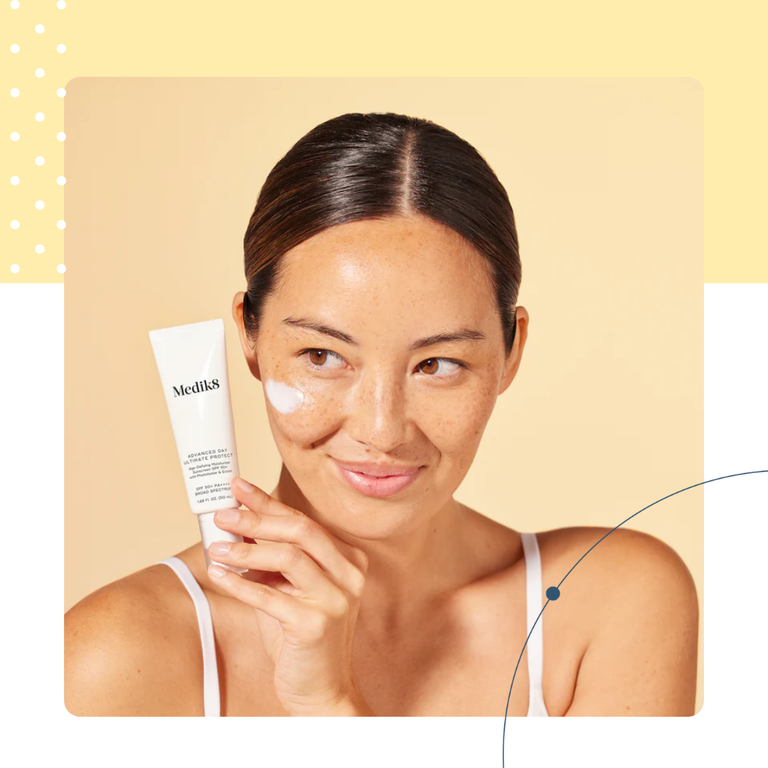There’s a skincare ingredient out there for almost every concern. Whether you’re looking to lighten dark spots, smooth wrinkles, combat oil or just keep your skin looking healthy, finding the right ingredients can make all the difference. However, the combination of these ingredients can also make a huge difference. Some work well together, others cancel each other out, and some can even be irritating when used at the same time.
Not sure which ingredients play nice together? We’re here to clear up the confusion. At Face Dr, our team of experts have decades of experience in the skincare world. They know all there is to know about the latest and greatest skincare ingredients and what exactly you should pair together or keep apart.
Want to save time and get an expert-approved skincare routine straight away? We offer free online skincare consultations where you can speak to one of our skin experts. They’ll be able to analyse your skin and recommend the best products to help with your exact concerns. They can answer any questions about ingredients and they’ll of course only recommend products that work well together.
Book your free video skincare consultation
Want to find out more about specific ingredients themselves? We’ve covered glycolic acid, bakuchiol and ceramides here.
Here’s what to pair and what to keep apart.
Skincare ingredients that work well together include:
- Hyaluronic acid with AHAs and BHAs
- Vitamin C with vitamin E
- SPF with everything
Skincare ingredients that don’t work well together include:
- Retinol and benzoyl peroxide
- Vitamin C and niacinamide
- An AHA and another AHA
Skincare ingredients that work well together

Hyaluronic acid and AHAs and BHAs
Hyaluronic acid is a great ingredient for anyone suffering with dehydrated skin or anyone looking to firm, plump and add more glow to their complexion. Luckily, this ingredient is not only great for most skin types, but it works with a lot of ingredients, too.
Despite having “acid” in the name, hyaluronic acid is actually gentle and soothing, as well as hydrating, so it can be used with any AHAs and BHAs like glycolic acid, lactic acid or salicylic acid. After using one of these exfoliating acids, your skin will love a dose of moisturising hyaluronic acid. It can even help to calm any irritation from using retinol.
Face Dr top pick:
- ZO Exfoliation Accelerator. Using two types of AHAs — glycolic acid and lactic acid — this serum can exfoliate away dead skin cells to reveal a brighter, younger complexion underneath.
Vitamin C with vitamin E
Not only do vitamin C and vitamin E not cause any problems when used together, they can actually work even better in combination than alone. They stabilise each other, making sure the ingredients work at their very best when on your skin.
Both ingredients fight free radicals and protect the skin from sun damage. You’ll often find these two vitamins already mixed in one serum, or you can simply layer two serums that include them.
Bonus: you can combine vitamin C and vitamin E with ferulic acid to make them even more stable and more effective at protecting the skin and reversing damage.
Face Dr top pick:
- ZO 10% Vitamin C Self-Activating. Target dullness, wrinkles and hyperpigmentation with this powerful vitamin C serum.
SPF with everything
Sunscreen is arguably the most important step in any skincare routine as the sun can cause everything from premature ageing to hyperpigmentation—and not to mention skin cancer. Luckily, your sunscreen should work with every ingredient in your routine. Opt for a high-grade sunscreen of at least SPF 30 that can protect your skin from UVA and UVB rays.
However, one thing you should never mix with an SPF product with is another product. As tempting as it can be to mix your sunscreen into your moisturiser or even foundation for an easier application, this can weaken the effectiveness of the SPF.
Face Dr top pick: ZO Broad Spectrum SPF 50. This mineral sunscreen is one of the most protective on the market. It can protect against UVA and UVB rays as well as other damaging types of light (like HEV and I-RA) to keep skin looking young, bright and healthy.
Skincare ingredients that don’t work well together

Retinol and benzoyl peroxide
Retinol is a powerful ingredient for anti-ageing and reversing damage and benzoyl peroxide is a powerful ingredient when it comes to treating acne. But the two simply don’t work together.
That’s because they deactivate each other. So while applying them both to your skin won’t necessarily damage it, it will make each ingredient much less effective. If you want to use both, simply use them on different nights in your routine.
Benzoyl peroxide can also cancel out vitamin C, too, so be sure to use them on alternative days.
Face Dr top picks:
- ZO Retinol Skin Brightener. Brighten hyperpigmentation, reverse signs of ageing and even out the skin tone with this retinol serum.
- ZO Acne Control. Treat current breakouts and stop new acne from forming with this benzoyl peroxide-containing cream.
An AHA with another AHA

AHA stands for alpha hydroxy acid. They’re water-soluble acids that are often derived from fruit or sugar cane and can be found in everything from cleansers to toners to serums. AHAs work to loosen the bonds between dead skin cells on the surface of the skin to allow them to be sloughed off more easily. This can help with everything from hyperpigmentation to dull skin, signs of ageing to acne.
There are so many great AHAs out there — just think of glycolic acid, lactic acid and mandelic acid — but they don’t work well together. That’s because each one is an exfoliant and can be extremely irritating to the skin if over used. They can strip the skin of its natural oils, leaving it damaged, dry and overly sensitive.
You should also avoid using AHAs with retinol at the same time as this combination can also be too irritating for the skin.
However, an AHA can work well with another AHA if the percentages have been formulated correctly. That’s why you can find products with more than one AHA in them. Just avoid using two different AHA products at the same time.
You can use an AHA with a BHA, though. BHA stands for beta hydroxy acid and these are oil-soluble. This means they are absorbed deeper into the skin to exfoliate inside the pores, whereas AHAs primarily work on exfoliating dead skin off the surface of the skin. By combining them, you can get the best of both worlds for a bright and glowing complexion. This combination may be too sensitising to some people though, so if you notice any dryness, flakiness or redness, try using just one.
Face Dr top picks:
- AHA Retexturising Serum. Formulated with multiple AHAs (in the right amounts!) this serum can exfoliate the skin for a clearer, brighter and smoother look.
- ZO Exfoliation Accelerator. Using two types of AHAs — glycolic acid and lactic acid — this serum can exfoliate away dead skin cells to reveal a brighter, younger complexion underneath.
Vitamin C and niacinamide
Vitamin C has become a go-to ingredient for those looking to brighten dark spots and even out their complexion. But it needs to be specific pH to work and other skincare ingredients can easily change this. So just like how retinol and benzoyl peroxide cancel each other out, the same thing happens with vitamin C and niacinamide, an ingredient that can help with oiliness, redness and blemishes.
However, you can still use these on the same day and even at the same time. You just need to make sure you give one of the ingredients time to be absorbed before applying the second. So, you could either apply a vitamin C serum in the morning and a niacinamide serum at night, or simply wait 10 minutes between each one in the morning.
If you’re using vitamin C, avoid pairing it with benzoyl peroxide, too.
Face Dr top picks:
- ZO 10% Vitamin C Self-Activating. Target dullness, wrinkles and hyperpigmentation with this powerful vitamin C serum
- ZO Exfoliating Cleanser. Target oil, breakouts and redness with this exfoliating cleanser with niacinamide.
Face Dr top tip: Nervous about products not agreeing with each other? Once you’ve found a brand you love, try sticking to products from the same brand. Most ranges will formulate their products in a way to make sure that they’re all compatible, especially if the brand has recommended routines to follow. Still not sure? Run your routine by a skin expert to make sure all the ingredients work well together.
Need expert advice?

These are just some of the ingredients that work well together and some you should keep apart. But, of course, there are so many more out there. Want to make sure you’re using the right ingredients? That’s when getting tailored advice can help.
We offer free online skincare consultations where you can speak with one of our skin experts. On a 30-minute video call, they’ll be able to analyse your skin, ask about your concerns then recommend the best products out there to help with ingredients that will complement each other.
Whether you’re looking to tackle a specific concern—like dark spots, acne or wrinkles—or just keep your skin clear and glowing, our experts can recommend the perfect combination of ingredients. So not only will you be getting their top products recommendations, but you’ll know that your entire routine has the expert seal of approval when it comes to ingredients.
When it comes to products, we only ever recommend those we’ve seen first-hand results from, so you can trust you’re investing in something that will actually work.








